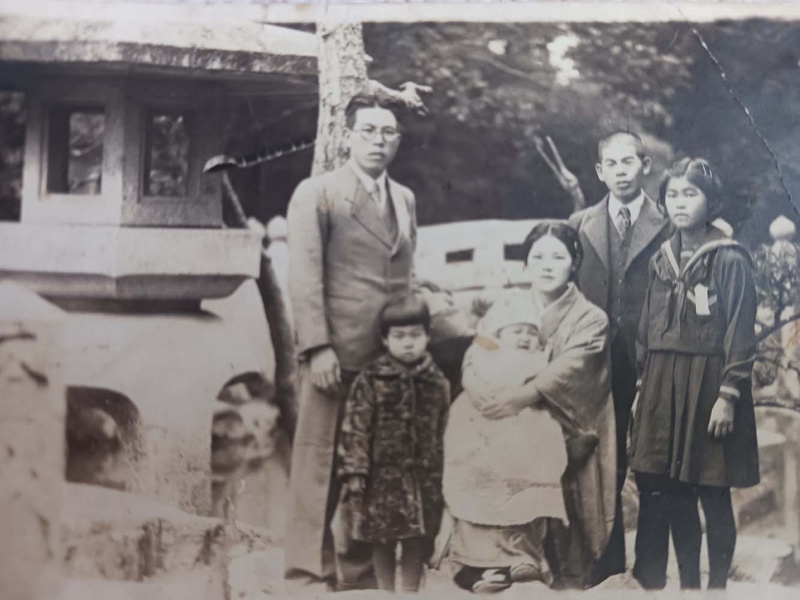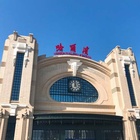End of the War and the Journey to Xinjing
It was in May 1945 that Emiko's father, Susumu, went to the battlefield. "Because my father had poor eyesight, he was one of the last to be drafted, and he was also the lowest-ranked soldier. He was drafted locally in Manchuria, and I saw him off at Suika Station with my mother, my younger brother Masanori, who was still a small child at the time, and my sister Fumiko. My father leaned out over the train's gangway and waved until he was out of sight." I had no idea then that this would be my last farewell to my father.
Three months after seeing his father off to the battlefield, the local Japanese gathered to listen to the Emperor's radio broadcast announcing Japan's defeat. With Manchuria no longer under Japanese control and their safety no longer guaranteed, the Japanese began to withdraw all at once. However, by that point, everything in the house had already been taken away by the Chinese. His mother, Kayo, grabbed what was left of the house and left Suika, holding Masanori's hand, while Emiko carried Fumiko, who had just turned one year old, on her back.
The four then traveled south by train and arrived in Xinjing, where the five families lived in one house and survived the winter from 1945 to 1946.
"Three families lived in one 8-tatami room, and two families lived in one 6-tatami room. One time, Soviet soldiers came and took away valuables like watches. I was afraid they would attack me because I had paper money wrapped around my stomach warmer, so I ran into the bathroom and hid. How did we get food? My mother bought it for me from somewhere, and I also earned money myself. I made money by selling coal that I found and flowers that were blooming around in the spring to Chinese people. After Japan lost the war, the positions of the Chinese and Japanese were reversed. But the Chinese bought the things I was selling as a Japanese child."
Their lives were extremely poor, they had head lice, their clothes were tattered and unsanitary, but despite these extreme conditions, Kayo continued to protect her children.
My mother's typhoid infection and sad news
Then, something happened that Emiko still finds terrifying to remember: Kayo contracted typhus and was put into quarantine.
"It was just me, my younger brother and sister. Other family members were in the house, and they did their best to comfort us. But I was constantly thinking about what would happen if my mother died, and I was terrified. When I went to visit my mother in the house where she was isolated, it was such a dark place that it made me even more worried. So I was really happy when my mother recovered from typhoid and returned to us. Thanks to her strong will, we didn't end up orphans."
Later, while he was still taking refuge in Xinjing, he received sad news. A comrade came to visit him and told him that his father, Jin, had died in a Soviet prison camp in Mudanjiang.
"The person was Yamazaki, from Nara. He brought back cufflinks as a memento of my father. I don't remember how Yamazaki found out where we were and came to visit us. I learned that Yamazaki had heard this story from my father when he was still alive. Apparently, we could have been reunited in Xinjing, but my father thought that our family was still in Suika after the war, so he took the train north. For some reason, the friend who was with him at the time got off at Xinjing instead of going north. The friend asked my father, 'Do you want to get off with us, Kono?' but my father refused, saying, 'No, I have to go to Suika where my family is.' In the end, my father was captured by the Soviet army where he had gone north and sent to an internment camp. Meanwhile, the friend who got off at Xinjing was able to reunite with his family there. We were also in Xinjing. I regret it so much when I think that if my father had gotten off at Xinjing, not only would they have been able to be reunited, but he would not have been taken prisoner of war."
In the Soviet military camp, Susumu, who could speak Chinese, served as an interpreter, but one day he collapsed in the toilet and died. When Kayo heard the story from her husband's war comrade, she pressed her face against a pillar and cried silently. The image of that moment burned into the mind of Emiko, who was only 9 years old at the time, has not faded even now, more than 75 years later.
To my parents' home without my father
The four then traveled south by train from Xinjing and arrived at a port. The warship, with the repatriates crammed into its bottom, headed for the port of Senzaki in Yamaguchi Prefecture. "When we boarded the ship, the sea before us was yellow and murky. At the time, I didn't know why, but now I think it was probably because of the murky water flowing into the sea from the Yellow River."
The ship arrived at Senzaki Port in the spring of 1946. At the temple where I stayed, I saw a mosquito net for the first time in my life. "I remember thinking, What is this?"
The family moved from Senzaki to live at Susumu's childhood home in Chitose Village, Oita Prefecture (now Bungo-Ono City).
"We were still children, so we just followed our mother's decisions. My father had already passed away, so I think my mother could have returned to her own parents' home. However, I think she felt a sense of responsibility to return to my father's parents' home and pass the family business on to my younger brother. My father's parents were farmers, but my mother had no experience in farming. So, it was all unfamiliar to her, and I think she had a really hard time. I was also made to help with farm work, such as weeding the rice fields, from early in the morning. I couldn't help but feel disgusted and wondered why I had to do this."
She was able to endure it all because she had seen her mother struggling with the unfamiliar task of farming at her husband's parents' house, where her husband was absent.
© 2022 Keiko Fukuda







